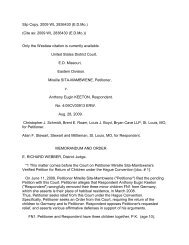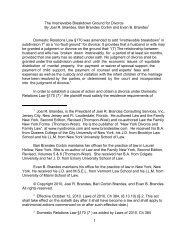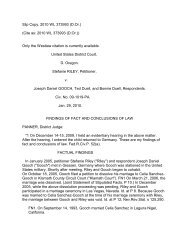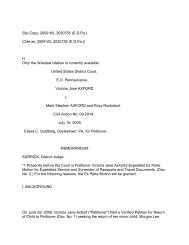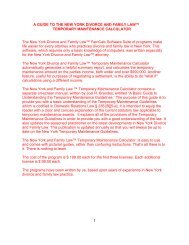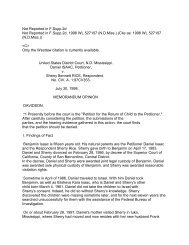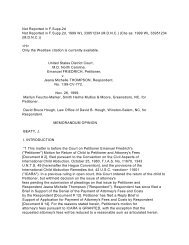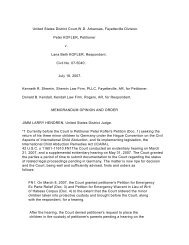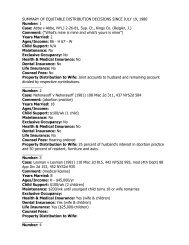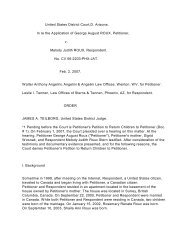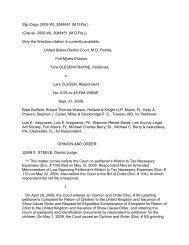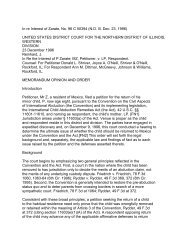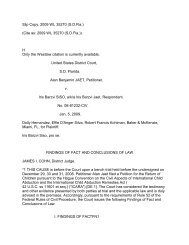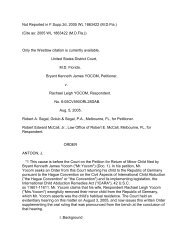Etienne v. Zuniga
Etienne v. Zuniga
Etienne v. Zuniga
Create successful ePaper yourself
Turn your PDF publications into a flip-book with our unique Google optimized e-Paper software.
*8 The Court, along with counsel for the parties, interviewed E.N. in chambers without<br />
the robe and other formalities of the courtroom. Tr. 182-237. During, the interview, E.N.<br />
displayed a thorough understanding of the purpose of the interview and the Court's<br />
proceedings in general that involve her parents. Id. E.N. was articulate and specific in<br />
her answers to counsel and the Court's questions. Id.<br />
She asked for clarification when she did not understand a question and added<br />
specificity to her answers when asked to do so. Id. E.N. discussed at lenght her life in<br />
Mexico and her life in the United States with respect to her friends, school, church, and<br />
family. Id. E.N. was clear in her preference for remaining in the United States and in her<br />
objection to being returned to Mexico. Tr. 231-32; 235.<br />
Here, the Court concludes that Villarreal has established by a preponderance of the<br />
evidence that E.N. is of a sufficient age and degree of maturity to have her views taken<br />
into account. E.N. is fourteen years old and will turn fifteen in the summer of 2010. Tr.<br />
184-85; Exh. 4. If E.N. were sixteen years old, the Convention would cease to apply<br />
altogether. Convention, art. 4. Moreover, the Perez-Vera Report, in discussing the<br />
mature child exception, states that "such a provision is absolutely necessary given the<br />
fact that the Convention applies, ratione personae, to all children under the age of<br />
sixteen; the fact must be acknowledged that it would be very difficult to accept that a<br />
child of, for example, fifteen years of age, should be returned against its will." Id. at P<br />
30. Indeed, the Court finds that the purpose and intent of the Convention's mature child<br />
exception would be contravened if the Court were to return E.N. against her will. See id.<br />
Therefore, the Court concludes that <strong>Etienne</strong>'s petition with respect to E.N. is denied<br />
based on her objections to return.<br />
The Court also interviewed B.N. in chambers without the presence of the parties'<br />
counsel. Tr. 303-306. B.N. was clear in his preference for remaining in the United<br />
States and in his objection to being returned to Mexico. Tr. 304-05.<br />
Although the Court concludes that eight-year-old B.N. is not of sufficient age and<br />
maturity to rely solely on his views in denying his return under the mature child<br />
exception, the Court will consider B.N.'s testimony in analyzing the well-settled defense<br />
below. See Anderson v. Acree, 250 F.Supp.2d 876, 883 (S.D.Ohio 2002).<br />
b. Well-settled Defense<br />
(i) Timeliness of Petition<br />
Article 12 of the Convention states that "where the proceedings have been<br />
commenced after the expiration of the period of one year" from the date of the wrongful<br />
retention, the court "shall also order the return of the child, unless it is demonstrated<br />
that the child is now settled in its new environment." Thus, the Court must first decide<br />
when the proceedings commenced and second, whether such commencement<br />
occurred within one year from the date of the wrongful retention.<br />
*9 ICARA states that proceedings commence in a civil action, for purposes of Article<br />
12, when a party files a "petition for the relief sought in any court which has jurisdiction



